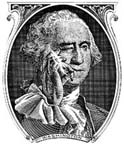4.19.2004
1 Punch, 2 Prosecutions, No Double Jeopardy, Justices Rule
By DAVID STOUT
April 19, 2004
WASHINGTON, April 19 — Billy Jo Lara had a tendency to get into trouble, of that there is no dispute. But the problems of Mr. Lara, a member of the Turtle Mountain Band of Chippewa Indians in North Dakota, hardly seemed the stuff of constitutional issues.
Yet that is what they became on June 13, 2001, when Mr. Lara struck a law enforcement officer on the territory of the Spirit Lake Tribe, knocking him cold. This unfortunate but seemingly minor incident set the stage for a test of the Constitution's "double jeopardy" clause.
The Supreme Court ruled today, 7 to 2, that Mr. Lara could be charged and tried twice for what might seem, at least to a nonlawyer, to be the same crime, despite the "double jeopardy" clause in the Fifth Amendment: "nor shall any person be subject for the same offense to be twice put in jeopardy of life or limb."
But first, a little background from court papers.
Mr. Lara lived for a time on the Spirit Lake Reservation with his wife, a member of the Spirit Lake Tribe, and children. After several incidents in which Mr. Lara was accused of serious misconduct, the Spirit Lake Tribe ordered him off the reservation. On June 13, he violated that expulsion order by reappearing on the reservation, leading to his encounter with the federal officers from the Bureau of Indian Affairs, one of whom wound up unconscious.
Mr. Lara, described as drunk and belligerent in court papers and news accounts of the June 13 incident, pleaded guilty in Spirit Lake Tribal Court to a charge of "violence to a policeman" and served 90 days in jail. When he got out, he might have thought his legal troubles were over.
They were not. Federal prosecutors charged him in the United States District Court of North Dakota with assaulting a federal officer, basing the charge on the same events of June 13, 2001. But the federal charge could mean as much as 20 years in prison.
Mr. Lara sought to set aside the federal charge, citing the double-jeopardy clause. The government countered by arguing that the clause does not bar successive prosecutions by "separate sovereigns," in this instance the tribe and the United States of America.
A magistrate judge sided with the government, but a panel of the United States Court of Appeals for the Eighth Circuit, in St. Louis, reversed and found for Mr. Lara, holding that the tribal court was exercising "a federal prosecutorial power," and so "dual sovereignty" did not apply.
The full Eighth Circuit reversed the panel in a 7-to-4 ruling, making Mr. Lara's troubles grist for a Supreme Court review, especially since the Court of Appeals for the Ninth Circuit, based in San Francisco, had reached a different conclusion in a similar case.
In a decision written by Justice Stephen G. Breyer, the Supreme Court ruled today that there was no double-jeopardy violation because "the Spirit Lake Tribe's prosecution of Lara did not amount to an exercise of federal power, and the tribe acted in its capacity of a separate sovereign."
Consequently, Justice Breyer wrote, there was no bar to a federal prosecution for "a discrete federal offense."
Nor did it avail Mr. Lara that he is not a member of the tribe that prosecuted him. The court majority held that Congress had granted Indian tribes the power to prosecute nonmember Indians, and that there was no constitutional obstacle to its having done so.
Justices David H. Souter and Antonin Scalia dissented, holding in part that the tribal prosecutors were essentially exercising power delegated by the federal government. In a decision by Justice Souter, the dissenters asserted that "no one could possibly deny that the tribes are subordinate to the national government."
The two dissenters said, in a phrase that perhaps even the majority might agree with, that tribal jurisdiction is "an area peculiarly susceptible to confusion."
In any event, Mr. Lara's troubles, which led to today's ruling in United States v. Lara, 03-107, are not over.
Copyright 2004 The New York Times Company
